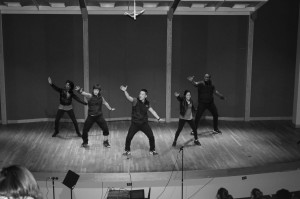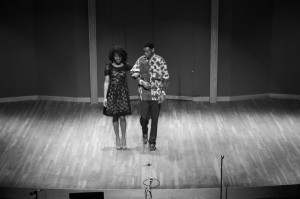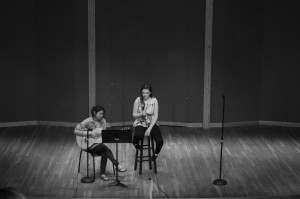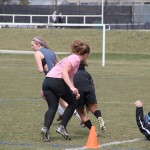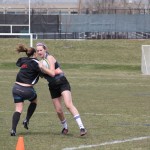By Emily Feldmesser
Transcript Correspondent
April 1 brought a bilingual poetry reading by Spanish professor Juan Rojas for the release of Rojas’ new collection, “LUZ/LIGHT.”
Accompanying Rojas was his editor, Ivan Vergara, and his translator Jennifer Rathbun, a professor at Ashland University. Rojas has named his work “transfronterizo,” or “transborder,” poetry because he’s constantly crossing borders, both physically and metaphorically.
Rojas said he has poems written in “Spanglish,” a mix of both English and Spanish, and even some written in Portuguese.
“Poetry is usually written in one’s mother’s language,” he said.
Rojas said Vergara, editor of Ultramarina Editorial, asked him to publish a collection of his poems when he was living in Portugal. Vergara was working on a collection of his own, so Rojas convinced him to publish them together.
When either Rojas or Vergara read their poem in Spanish, Rathbun would read the stanza back in English to the audience of approximately 100 people comprised of students and people from the Delaware area.
The stories would range from his hometown of Ciudad Juarez, Mexico, or about his time in Portugal.
“In order to talk not just about my experience (of being an immigrant to the U.S.), but in everyone’s experience, and to give a voice to those so called ‘undocumented’ immigrants is that ‘LUZ/LIGHT’ begins to happen,” Rojas said about his inspiration for his new collection.
Rojas said this poetry session is a celebration of language, which was in turn organized to celebrate the release of his new collection.
Junior Hazel Barrera, president of VIVA LatinoAmerica, said it’s important for students to see what other publishers are doing and how creative they are.
In between the poems, Rojas would tell stories describing the background of the poem he was about to read.
“I began daydreaming about being a poet since I was in elementary school in my hometown of Ciudad Juarez, Mexico,” he said.
“I used to read many Spanish and Latin American authors. I wanted to be like them, travelling, reading and writing.”
Freshman Emma Drongowski found the differences in the poems being read in two languages to be very interesting.
“Although the poems were perfectly translated, the rhythm and essence of the poems did not translate perfectly,” she said.
Freshman Nick Fonesca enjoyed how expressive both the poets were in their readings.
“When Vergara spoke, he used much imagery and accented emotion, while when Rojas spoke, I felt like he was telling a story,” he said.
After the reading, Rojas and Vergara had a bookmaking workshop, in which participants decorated the covers of “LUZ/LIGHT” and were able to keep their creations.
